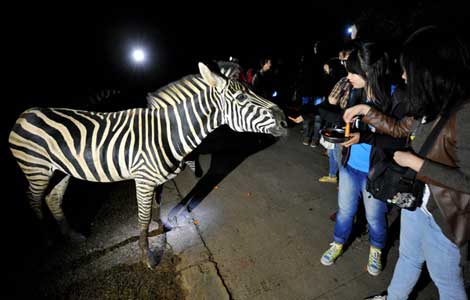From the Chinese Press
Updated: 2013-08-27 06:57
(China Daily)
|
|||||||||
Online idioms not fit for lexicon
Some netizens have suggested that some new "idioms" that have become popular online and are "user-friendly" be included in the Modern Chinese Dictionary. But since infrequent or non-Internet users may not understand these idioms, the netizens' suggestion should not be taken seriously, says an article in Changsha Evening News. Excerpts:
The Chinese language, like any other language, faces the problem of which outdated terms and idioms to discard and which new ones to embrace to maintain its vitality and dynamism. So even though some "new idioms" have become very popular with regular Internet users, they cannot be immediately included in the Modern Chinese Dictionary.
Since the Modern Chinese Dictionary serves as the standard, and authoritative and serious reference book to other dictionaries, the entries in it have to have three major characteristics, which the new online idioms lack.
The new user-friendly online idioms are the products of heated online discussions on a wide range of topics. This means the chances of future online debates continuing to throw up newer idioms and making the ones in circulation redundant are very high. So where do we draw the line?
Most of the idioms in the Modern Chinese Dictionary are the result of history; they have historical allusions and have evolved overt long periods of time. And the application of such idioms is much wider in society, unlike the ones doing the rounds on the Internet now.
The idioms thrown up by the Internet could be included in the Modern Chinese Dictionary only if they survive the test of time. But until then, we have to make do with the idioms that have universal acceptance.
Tighten animal farm regulations
More than 20 crocodiles escaped from a privately owned breeding farm in Shantou, Guangdong province, on Aug 18, when its wall collapsed because of the flooding triggered by Typhoon Utor. The incident highlights the loopholes in the management of wildlife breeding sector, says an article in Beijing Morning Post. Excerpts:
The breeding of protected or even dangerous animals, such as crocodiles, boa constrictors and cobras, is becoming popular. Many of these animals are bred to be sold as pets, but the farms, if not managed properly, could pose a threat to people's lives.
Although it is not known whether the escaped crocodiles have attacked any humans or how many of them have been caught, the incident shows that management of private animal breeding farms are not what it should be.
According to regulations, people or companies who want to raise or breed wildlife have to apply to local forestry authorities. And after getting the clearance from the local authorities, they have to seek the permission of the State Forestry Administration before they can actually start a farm.
But thanks to the huge profits generated by the business, many people have been breeding dangerous animals illegally. Besides, the lack of effective supervision has emboldened even licensed breeders to violate some rules in the day-to-day running of their farms.
Lenient punishment for violating the rules has encouraged many people to enter the animal breeding business both legally and illegally. In some cases, local authorities have had to shoulder the responsibility and bear the cost of catching the dangerous animals that have escaped from breeding farms because of accidents or mismanagement.
It's time the authorities tightened supervision and intensified legislative efforts to curb illegal breeding of dangerous animals. Moreover, the authorities should also impose stricter punishment on farm owners who violate the rules to deter others from taking things for granted.
(China Daily 08/27/2013 page9)
Most Viewed
Editor's Picks

|

|

|

|

|

|
Today's Top News
PLA Navy heads for routine drill in W.Pacific
Business confidence 'buoying growth'
Prosecutors seek heavy punishment for Bo Xilai
UN to contact US over spying report
Caution urged in online reporting of violence
China to cement ties with Singapore
Group renting debate revived by boy's death
Public mixed over changes to train ticket returns
US Weekly

|

|
















